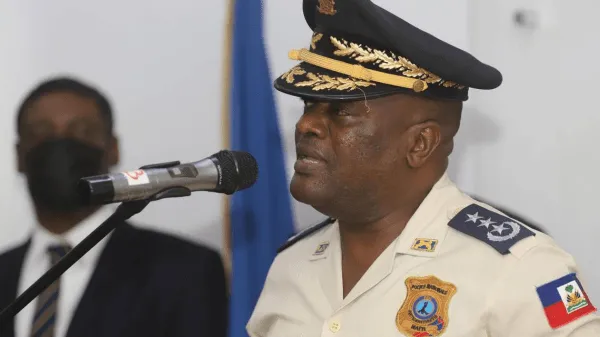Haiti’s government has taken a step towards police reform by ousting Frantz Elbe, the director of the National Police, and replacing him with former police chief Normil Rameau. The move comes as the country grapples with a surge in gang violence, which has left over 2,500 people killed or injured in the first three months of the year. The police department is severely underfunded and ill-equipped, with only 4,000 officers on duty at a time in a country of over 11 million inhabitants.
The situation is dire, with gangs controlling 80% of the capital Port-au-Prince and possessing more powerful weapons than the police. Officers have come under attack from gangs, with nearly two dozen police officers killed in the past few months. The recent killings targeted three officers from a newly formed anti-gang tactical unit who were on patrol in an armored vehicle. A fourth officer remains missing.
The police unions have been repeatedly calling for Mr. Elbe’s resignation and arrest, citing his inability to protect officers under attack. Gangs have raided and burned at least 30 police stations and sub-stations in recent months, part of a series of attacks that began on February 29th. The violence has led to the eventual resignation of Prime Minister Ariel Henry.
The new Prime Minister, Garry Conille, has expressed his commitment to strengthening the police department, saying that he will prioritize reform during his tenure. The police unions have welcomed the move, saying that it is long overdue. Mr. Conille has also gone on patrol with police officers, wearing a flak jacket and helmet, as part of his efforts to understand the challenges faced by officers on the ground.

Frantz Elbe (Via Frantz Elbe/Twitter)
The international community has provided training and resources to help boost Haiti’s National Police, which is also awaiting the UN-backed deployment of a police force from Kenya. The UN report has documented at least 36 officer killings in gang-related violence from January to mid-August last year.
The appointment of Mr. Rameau as police chief is seen as a turning point in efforts to reform the police department. Prior to his appointment as director general of police under former President Jovenel Moise, he oversaw the detective division. He was ousted as police chief in November 2020 after the country’s Prime Minister Joseph Jouthe accused him of being incompetent and not producing results.
Despite the challenges, Mr. Rameau is determined to reform the police department, saying that he is committed to improving the situation for officers and the people of Haiti. The police unions have welcomed his appointment, saying that he has the experience and expertise to lead the department.
The ouster of Mr. Elbe and the appointment of Mr. Rameau mark an important step towards police reform in Haiti. However, much work remains to be done to address the root causes of the crisis and improve the situation for officers and the people of Haiti. The government and the international community must work together to provide the necessary support and resources to help Haiti’s National Police effectively combat gang violence and maintain order in the country.
